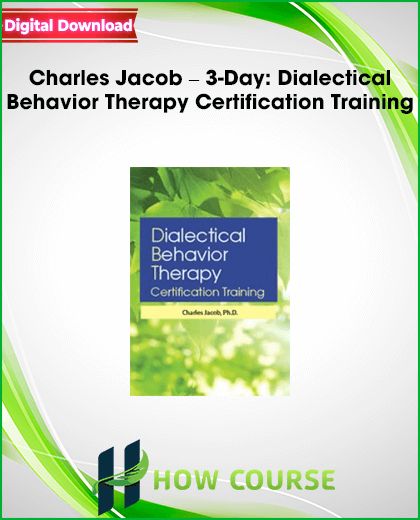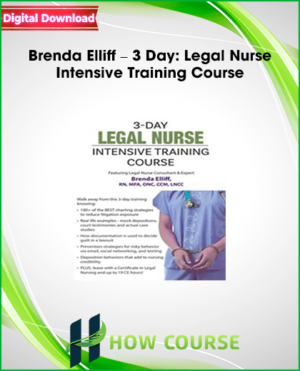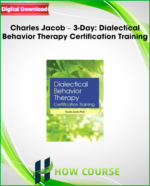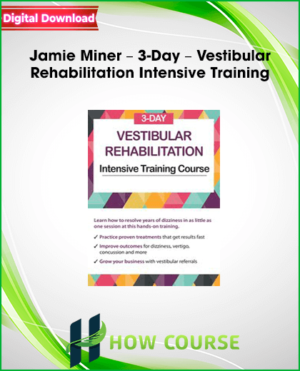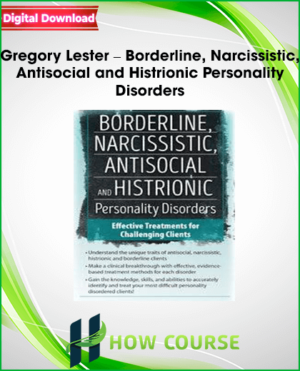Charles Jacob – 3-Day: Dialectical Behavior Therapy Certification Training
Faculty:
Charles Jacob
Duration:
18 Hours 44 Minutes
Format:
Audio and Video
Copyright:
Apr 22, 2020
Description
Dialectical Behavior Therapy is a powerful, evidence-based treatment that allows clinicians to provide positive outcomes for clients of all ages struggling with stress, depression, trauma, suicidal and self-destructive behaviors and a variety of other clinical presentations.
This 3-day Certification Training will build the core competencies you need to bring DBT into your clinical practice and effectively use it with a wide range of client types. In just 3 days you’ll be given a roadmap to treat individuals using the skills and techniques from DBT so you can help your most challenging clients reach new levels of healing.
Even if you’ve completed other Dialectical Behavior Therapy (DBT) trainings, this program will increase your competency and clinical sophistication with DBT when working with adults, youth, substance users and trauma survivors in a wide variety of settings.
Best of all, this training meets the educational requirements when applying to become Certified in Dialectical Behavior Therapy (C-DBT) through Evergreen Certifications. Certification lets colleagues, employers, and clients know that you’ve invested the extra time and effort necessary to understand the complexities of using DBT in counselling. Professional and clinical experience standards apply. Visit www.evergreencertifications.com/dcbt to get started!
Purchase today and get the skills and confidence you need to successfully help your clients with the power of DBT!
PESI, Evergreen Certification Institute, and Charles Jacob, Ph.D., are not affiliated or associated with Marsha M. Linehan, PhD, ABPP, or her organizations.
Handouts
Manual – 3-Day Dialectical Behavior Therapy Certification Training (5.1 MB) 144 Pages Available after Purchase
Outline
Foundations of DBT
Biosocial Theory
Characteristics of DBT
DBT as an evidence-based practice
Dialectics: the balance of acceptance and change
DBT in the Clinical Setting
Application of DBT in the individual and group therapy setting
Skills training methods
Validation strategies
Research and limitations
DBT Skills Training
Mindfulness: Cultivate the Skills at the Core of Successful DBT Therapy
Acceptance vs. judgement
Wise mind – achieve harmony between emotion and reason
Accessible exercises for building mindfulness skills
Observation – keep clients calm, centered and aware
Describe – overcome assumptions
Participation – release judgement and fear
Strategies for teaching mindfully and exercises for therapy
Interpersonal Effectiveness: Skills to Build Better Relationships and Lives
Tools to identify strengths
Balancing relationships with self-respect
Exercises and role play guidance on how to:
Develop healthy assertiveness skills
Enhance conflict resolution skills
Build empathy
Keep problems from building up
Resist pressure
Top strategies for changing behavior
Emotion Regulation: Practical Skills for Healthier Emotions and Greater Resilience
Strong emotions and poor coping skills
How to change unwanted emotions
Reduce emotional vulnerability while practicing self-care
Opposite action skills to reduce maladaptive behavior
Emotion Regulation exercises
Self-soothing strategies that work
Learn the sleep hygiene protocol
Distress Tolerance: Skills to Cope with Painful Moments and Survive Crisis
Developing crisis survival and reality acceptance skills
4 options to solving problems
Problem solving case studies
Using pros and cons to make decisions
STOP skills to manage crisis situations
The steps to practicing radical acceptance
Tools to accept change
DBT in Clinical Practice
Analyzing behaviors; chain analysis & missing links analysis
Diary cards and homework with clients
Identify therapy interfering behaviors
Develop skills to identify and manage self-harming & suicidal behaviors
Self-Harm and Suicidal Crises: A Roadmap for Assessment and Intervention
Screening and assessment tools for self-harming behaviors
Interventions and treatment considerations for the self-harming population
Suicide risk as a skills deficit problem
Tools and techniques to assess for level of risk
Firearms, medications, and lethal-means restriction plans that work
Safety plans and crisis intervention
Adapt DBT with Different Populations
Children and adolescents
Trauma survivors
Substance abusers
DBT: The Therapist and Consultation Group
3 ways to decrease therapist burnout
The characteristics of an effective DBT team
Integrating DBT into your practice
Faculty
Charles Jacob, Ph.D.
Charles Jacob, PhD, is a psychologist with over 15 years of clinical experience conducting and overseeing the delivery of mental health services to individuals with severe mood and personality disorders as well as their families. He is past president of the Pennsylvania branch of the American Counseling Association and maintains a robust private practice in the suburbs of Philadelphia as a licensed psychologist, professional counselor and marriage and family therapist.
In addition to training in Dialectical Behavior Therapy for the treatment of borderline personality disorder, Dr. Jacob is an expert in Cognitive Therapy and a highly regarded clinician and scholar. He is a recipient of PCA’s David W. Hall Advocacy Award, and has been a featured interview in Counseling Today as well as NPR’s The Pulse.
Dr. Jacob is a full time faculty member in the Human Development Quantitative Methods Division at the University of Pennsylvania’s Graduate School of Education. He received his PhD from The Pennsylvania State University and completed a year of additional training at the Center for Cognitive Therapy at the University of Pennsylvania.
Speaker Disclosures:
Financial: Charles Jacob is in private practice. He receives a speaking honorarium from PESI, Inc.
Non-financial: Charles Jacob is a member of the Pennsylvania Counseling Association; American Counseling Association; and the American Mental Health Counseling Association.
> Please contact our team if you have questions, or broken links via our email [email protected].

